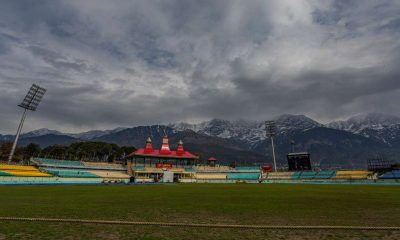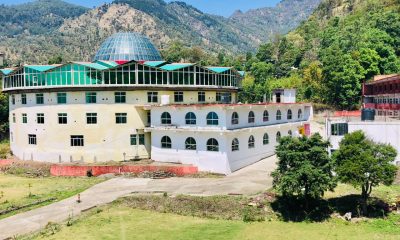Politics
Calcutta HC Judge Abhijit Gangopadhyay Resigns, Signals Political Leap Amidst Criticism

In a surprising turn of events, Calcutta High Court Judge Abhijit Gangopadhyay has tendered his resignation, paving the way for a potential entry into the political arena. The seasoned judge, who faced notable criticism from Bengal’s ruling Trinamool Congress for some of his judgments and observations, announced his decision on Sunday, declaring his intent to serve the people on a grander scale through politics.
Gangopadhyay’s resignation, effective immediately under Article 217 (1) (a) of the Constitution, was directly submitted to the President of India. In a statement to the media, he expressed, “My soul tells me that my tenure as a judge is over, and it is time to enter a bigger sphere and serve people. I will put in my papers on Tuesday.” The judge, known for his swift adjudications in cases impacting the common populace, hinted at joining prominent political entities, including the Left parties, Congress, or Bharatiya Janata Party (BJP), and even participating in the upcoming Lok Sabha elections.
Although the judge refrained from specifying his political allegiance, sources within the state BJP suggest that he is likely to join the party in the coming days. A press conference is scheduled for the afternoon, where further details may emerge.
Gangopadhyay, aged 62, commenced his journey in the high court as an additional judge in 2018, attaining the status of a permanent judge in July 2020. Having resigned from the West Bengal Civil Service over a decade ago to pursue a career in law, he has been widely recognized for delivering prompt judgments in cases affecting the common populace.
One of his significant decisions came in May 2022 when he directed the Central Bureau of Investigation (CBI) to investigate the alleged appointment irregularities by the West Bengal School Service Commission and West Bengal Board of Secondary Education between 2014 and 2021. Allegedly, bribe payments ranging from ₹5-15 lakhs facilitated job placements for individuals who had failed selection tests.
This decision triggered a parallel investigation by the Enforcement Directorate (ED), leading to the arrest of Education Minister Partha Chatterjee and his associate Arpita Mukherjee in July 2022. The subsequent ED charge sheet revealed assets worth ₹103.10 crores linked to the duo. Numerous TMC leaders and government officials were subsequently apprehended.
In a subsequent move in April 2023, Judge Gangopadhyay ordered the CBI to delve into a suspected recruitment scam in civic bodies across Bengal. Both the CBI and ED, in correspondence with the Supreme Court, indicated the interrelation between the two scams.
Of note, Chief Minister Mamata Banerjee’s nephew, Abhishek Banerjee, along with his wife and parents, emerged as suspects in the school recruitment scam. The unfolding developments mark an intricate blend of legal acumen, political controversy, and potential transformation as Judge Abhijit Gangopadhyay steps into a new chapter, leaving the judiciary to explore the dynamic realm of politics.
Politics
Delhi Chief Minister Arvind Kejriwal Arrested: BJP’s Anti-Corruption Drive in Full Swing

Under the watchful eye of the Enforcement Directorate (ED), the Chief Minister of Delhi, Arvind Kejriwal, found himself in cuffs on March 21, embroiled in the liquor policy scandal. Despite his plea for protection from arrest, the Delhi High Court’s refusal marked a significant development in the ongoing fight against corruption. This arrest underscores the stark reality that no one, regardless of their political stature, is above the law.
Kejriwal’s repeated evasion of the ED’s summons raises questions about his integrity and commitment to transparency. As a public figure entrusted with governance, his reluctance to cooperate casts a shadow over his claims of innocence. Instead of leading by example, Kejriwal’s actions have tarnished the image of political morality, setting a regrettable precedent for the nation’s capital.
The irony is palpable as Kejriwal, once a vocal critic of the Congress party’s alleged corruption, now finds himself in an alliance with them. This unexpected partnership raises eyebrows and fuels suspicions about underlying agendas in the political landscape.
The saga of corruption surrounding Kejriwal and his associates extends beyond the liquor scandal. Former cabinet members and party affiliates, including Satyendra Jain, Manish Sisodia, and Sanjay Singh, have faced incarceration on charges of corruption and money laundering. Despite cries of political vendetta, their repeated denial of bail underscores the gravity of the accusations against them.
The modus operandi of the ED and other investigative agencies signals a paradigm shift in combating corruption under the BJP government. With a resolute stance against malpractice, Prime Minister Narendra Modi has empowered these agencies to pursue justice without bias or impediment. This proactive approach marks a departure from the previous era of political protectionism, where corruption thrived unchecked across party lines.
Kejriwal’s downfall signifies more than just the unraveling of a political facade; it symbolizes the disillusionment of a nation that once hailed him as a champion of anti-corruption. His journey from grassroots activism to governmental leadership has been marred by allegations of impropriety, revealing a stark betrayal of public trust.
The liquor scandal serves as a mere glimpse into a broader pattern of corruption that pervades Kejriwal’s administration. From lavish expenditures at the Chief Minister’s residence to systemic irregularities in departments like the Delhi Jal Board and Education, the rot runs deep. Each revelation further erodes the faith of Delhiites in their elected officials and underscores the urgent need for accountability and reform.
As Kejriwal’s political demise unfolds, it serves as a cautionary tale for aspiring leaders and a rallying cry for those committed to upholding the principles of integrity and transparency. In the fight against corruption, no stone should be left unturned, and no individual should be shielded from scrutiny, regardless of their position of power.
In the end, Kejriwal’s arrest serves as a sobering reminder that in the pursuit of justice, no one is immune, and the wheels of accountability will continue to turn, irrespective of political affiliations or personal agendas.
Politics
Go, Win. Will See You Soon”: PM To Ministers Ahead Of Lok Sabha Polls

In a stirring address brimming with confidence and determination, the Prime Minister of India rallied his ministers with a resounding message of empowerment and purpose ahead of the imminent Lok Sabha polls. With the political landscape poised for fervent campaigning and electoral battles, the Prime Minister’s words reverberated with a call to action and a promise of collective victory.
Addressing his cabinet members, the Prime Minister echoed a sentiment of unwavering resolve, encapsulated in the succinct yet powerful directive: “Go, Win. Will see you soon.” These words encapsulate not just a command but a rallying cry for the ministers to embark on their electoral campaigns with zeal, conviction, and a commitment to securing triumph for their respective constituencies.
Embedded within this rallying call is a profound sense of trust and empowerment, as the Prime Minister entrusts his ministers with the responsibility of representing the aspirations and interests of the electorate. It underscores a leadership style that values initiative, courage, and accountability, encouraging each minister to lead with confidence and conviction as they navigate the complex terrain of electoral politics.
Beyond mere rhetoric, the Prime Minister’s message serves as a strategic maneuver in the broader political landscape, signaling a unified front and a formidable resolve within the ruling party as they gear up for the electoral fray. It instills a sense of unity and purpose among party members, fostering cohesion and synergy in their collective endeavor to secure victory in the upcoming polls.
Moreover, the Prime Minister’s words carry a deeper significance, transcending the immediate context of electoral politics to embody a broader ethos of leadership and governance. By exhorting his ministers to “Go, Win,” he underscores the imperative of proactive engagement and decisive action in the pursuit of national progress and development.
At its core, the Prime Minister’s message reflects a profound understanding of the symbiotic relationship between leadership and grassroots democracy, wherein the success of individual ministers is intricately linked to the collective aspirations of the electorate. It underscores the importance of humility, empathy, and a genuine commitment to public service as guiding principles in the exercise of political power.
As ministers heed the Prime Minister’s call and embark on their electoral campaigns with renewed vigor and purpose, they carry with them not just the mandate of their party but the hopes and dreams of millions of citizens across the country. In their endeavors to secure victory in the Lok Sabha polls, they are not just political representatives but torchbearers of India’s democratic spirit and ethos.
In the days and weeks to come, as the electoral drama unfolds and the fate of constituencies hangs in the balance, the Prime Minister’s words will serve as a beacon of inspiration and motivation for his ministers. For in the pursuit of victory lies not just the fulfillment of political ambitions but the realization of a collective vision for a stronger, more prosperous India.
Politics
Transformative Development Unveiled: PM Modi Launches Rs 6,800 Crore worth Projects in Telangana

In a monumental move towards bolstering infrastructure and connectivity, Prime Minister Narendra Modi is set to kickstart a slew of development projects in Telangana today, amounting to a staggering Rs 6,800 crore. The much-anticipated event will witness the inauguration and foundation laying of initiatives spanning road, rail, petroleum, and natural gas sectors.
Scheduled to address a rally at Sangareddy, just 60 km from the capital, Modi’s visit aims to usher in a new era of growth and progress for the region. Among the noteworthy projects, the Civil Aviation Research Organisation (CARO) center in Hyderabad will be inaugurated, a state-of-the-art facility at Begumpet Airport, Hyderabad, dedicated to advancing research and development activities in the civil aviation sector. This Rs 350 crore facility is compliant with 5-STAR-GRIHA Rating and Energy Conservation Building Code (ECBC) norms, underlining its commitment to sustainability.
The Prime Minister is also set to unveil three crucial National Highway projects and lay the foundation stone for the six-laning of the 29 km Pune-Hyderabad Section of NH-65. This strategic move is poised to enhance connectivity to major industrial hubs in Telangana, particularly benefiting the Pashamylaram industrial area near Patancheru.
Rail infrastructure will witness a significant boost with the inauguration of the doubling and electrification of the Sanathnagar-Moula Ali rail line. Additionally, six new station buildings will be unveiled during the program, reflecting the government’s commitment to modernizing and expanding rail networks. The much-anticipated inauguration of the Multi-Modal Transport Service (MMTS) Train Service from Ghatkesar-Lingampalli via Moula Ali-Sanathnagar will extend the popular suburban train service into new areas, marking a milestone in regional transportation.
Further contributing to the region’s economic development, PM Modi will inaugurate the Indian Oil Paradip-Hyderabad Product Pipeline. Spanning a colossal 1,212 km and boasting a capacity of 4.5 MMTPA, this pipeline will traverse through Odisha, Andhra Pradesh, and Telangana. Designed to ensure safe and economical transportation of petroleum products from Paradip Refinery to delivery stations at strategic locations in Andhra Pradesh and Telangana, this pipeline is set to play a pivotal role in the region’s energy infrastructure.
Union Tourism Minister G Kishan Reddy shared insights into Modi’s itinerary, highlighting the Prime Minister’s visit to the revered Sri Ujjaini Mahakali Temple, where he will offer prayers, reinforcing the cultural and spiritual significance of the visit.
As Telangana braces itself for the unveiling of these transformative projects, the region can anticipate a surge in economic activities, improved connectivity, and a heightened quality of life for its residents. PM Modi’s visionary initiatives underscore the government’s unwavering commitment to propelling India into a future defined by sustainable growth and prosperity.
-

 Sports2 months ago
Sports2 months agoUnraveling the Challenge: IND vs ENG in Dharamsala – Rohit Sharma and Ben Stokes Contemplate Pitch Dynamics and Conditions
-

 Fashion2 months ago
Fashion2 months agoFashionable Highlights from Anant Ambani and Radhika Merchant’s Pre-Wedding Finale
-

 Featured2 months ago
Featured2 months agoDharamsala weather update, IND vs ENG: Will rain play spoilsport in India vs England 5th Test? Dharamsala weather update, IND vs ENG: Dipping temperatures, rain and sleet could play spoilsport at the HPCA Stadium during the fifth Test between India and England from Thursday.
-

 Fashion2 months ago
Fashion2 months agoMonica Lewinsky Transforms Career Path, Embraces Modeling for Sustainable Fashion
-

 Entertainment2 months ago
Entertainment2 months agoShah Rukh Khan greets guests with Jai Shree Ram ‘for good measure’ at Ambani pre-wedding bash, turns host.
-

 Featured2 months ago
Featured2 months agoByju’s CEO Raveendran says unable to pay salaries, lambasts investors for blocking funds
-

 Sports2 months ago
Sports2 months ago‘World’s shortest retirement’: Pat Cummins responds to prospect of Neil Wagner returning for 2nd NZ vs AUS Test
-

 Featured3 weeks ago
Featured3 weeks agoMPB College: Nurturing Tomorrow’s Healthcare Leaders Through Excellence in Education and Patient-Centered Care













